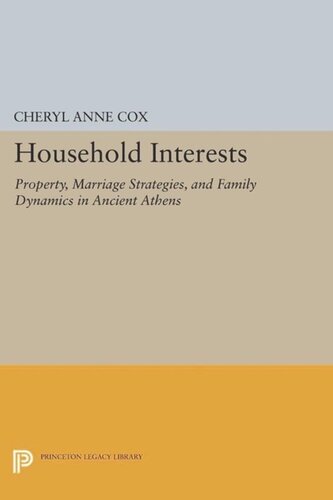

Most ebook files are in PDF format, so you can easily read them using various software such as Foxit Reader or directly on the Google Chrome browser.
Some ebook files are released by publishers in other formats such as .awz, .mobi, .epub, .fb2, etc. You may need to install specific software to read these formats on mobile/PC, such as Calibre.
Please read the tutorial at this link: https://ebookbell.com/faq
We offer FREE conversion to the popular formats you request; however, this may take some time. Therefore, right after payment, please email us, and we will try to provide the service as quickly as possible.
For some exceptional file formats or broken links (if any), please refrain from opening any disputes. Instead, email us first, and we will try to assist within a maximum of 6 hours.
EbookBell Team

4.8
84 reviewsHousehold Interests is one of the first books to explore in-depth the nature of the Greek household (oikos) in classical Athens. Whereas the oikos traditionally has been defined as the household of the nuclear family in Greece, Cheryl Anne Cox reveals it as a much more fluid structure, taking care to distinguish between the concepts of "household" and "family." The legal basis of the typical elite household emerges as Cox describes marriage patterns or strategies among the families represented in Attic orations and funerary inscriptions: property interests were a strong motivating force, with the elite marrying within their kin, primarily through paternal lines in which property was transferred. The author ultimately shows that the household was not limited to "family" or kinspeople. Friends, neighbors, concubines or prostitutes, and slaves also shared in property interests and all could have a profound influence on the household.
After first examining marriage patterns, Cox turns to inter-family relationships. Using anthropological sources and historical studies of European societies, she shows how property interest shaped often conflicted relations between parents and their children and among brothers, and yet it encouraged male charity toward sisters. Cox next considers how property transfer through adoption, guardianship, and remarriage, and the intervention of friends, concubines, and slaves, all contributed to expanding the boundaries of the household beyond kin.
Originally published in 1998.
The Princeton Legacy Library uses the latest print-on-demand technology to again make available previously out-of-print books from the distinguished backlist of Princeton University Press. These editions preserve the original texts of these important books while presenting them in durable paperback and hardcover editions. The goal of the Princeton Legacy Library is to vastly increase access to the rich scholarly heritage found in the thousands of books published by Princeton University Press since its founding in 1905.